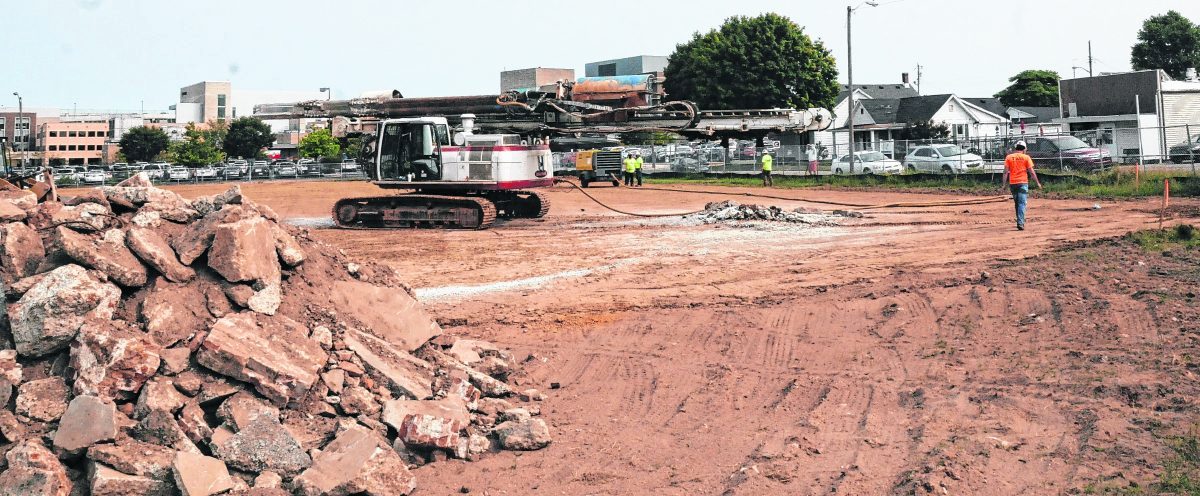
The sounds of heavy machinery and visible piles of dirt and concrete are telltale signs of progress on a new senior housing development in Seymour.
Construction of a $12.5 million apartment complex for senior citizens age 55 and older has been underway for about a month now.
Thrive Alliance and Jonesboro Investments Corp. are developing the 64-unit Crossroads Senior Apartment Homes on just more than 2 acres at 500 S. Poplar St. south of the Schneck Medical Center campus.
[sc:text-divider text-divider-title=”Story continues below gallery” ]Click here to purchase photos from this gallery
After a yearlong construction period, Thrive Alliance hopes to welcome Crossroads’ first tenants in late summer of 2021.
With Seymour’s senior population increasing at a fast rate, the project is meeting a need in the city for housing options for seniors with low to moderate income.
“Seymour needs more residential options, and Crossroads will help solve some of what we need,” said Seymour Mayor Matt Nicholson.
The location provides a unique opportunity for seniors to have affordable housing for independent living, said Mark Lindenlaub, executive director of Thrive Alliance.
Serving as the local Area Agency on Aging, Thrive Alliance is developing a partnership with Schneck to provide onsite access to health screenings, health education and counseling services, nutrition education, dementia care and other support programs and resources to give residents the ability to age in place, remain active and stay connected.
“We are excited to be working with the visionary staff at Schneck to create housing plus services that encourage and support healthy lifestyles,” Lindenlaub said.
Those services also will be extended to seniors in the surrounding low-income neighborhood to help foster revitalization and efforts to connect people, he added.
Near Seymour’s downtown, Crossroads Senior Apartment Homes will be within walking distance of shopping and dining and parks facilities, including Westside, Kasting and Gaiser parks, for recreation.
The apartments are being constructed on the northeast corner of the property, which is bordered by Poplar, Laurel, Pine and Oak streets.
Once contaminated from former industrial uses, the property has undergone more than a decade of environmental cleanup and has been approved for development by the Indiana Department of Environmental Management.
“Their choice of location also helps take one of our eyesores and turn it into a fresh, new facility,” Nicholson said. “We will continue to work on other properties in the community with a goal of improving many neighborhoods.”
The facility will feature 24 one-bedroom units and 40 two-bedroom units. Designs include an outdoor gathering area for residents and 80 parking spots along with a stormwater retention basin.
Since the apartments are income-based, tenants will have to be within a certain income range to qualify. Rent costs are expected to be between $525 and $700 per unit. Units will be 800 square feet for one bedroom/one bath and 900 square feet for two bedrooms/one and a half baths.
The four-story complex has been designed with energy features to lower costs for residents and other elements to increase safety and socialization for people with disabilities or movement impairments.
Small private meeting rooms, large community gathering spaces, exercise equipment and technology are being integrated to support residents’ social and physical health.
A biophilic design is being utilized to help create a dementia-friendly environment, according to information provided by Thrive Alliance. That means differing construction materials and variations in features will stimulate the senses and improve alertness and cognitive functioning while connecting occupants to the natural environment.
South-facing windows and open layouts for common areas will provide natural lighting, and variations in colors in hallways will define and help identify areas to reduce confusion and disorientation.
As part of the funding for the project, Thrive Alliance received $1.2 million in low-income housing tax credits in 2019 from the Indiana Housing and Community Development Authority.
In June, the Seymour City Council approved a tax abatement incentive for the project and pledged to invest $51,000 in local funding to install new sidewalks around the property.
The total amount of the abatement is projected to be $305,089.
Lindenlaub said the state funding along with support from the city made the project possible.
